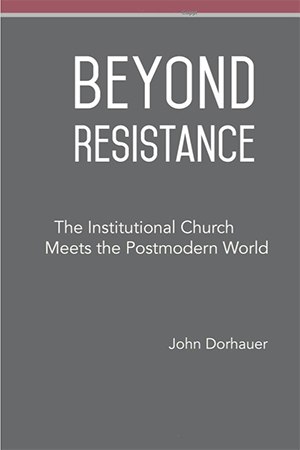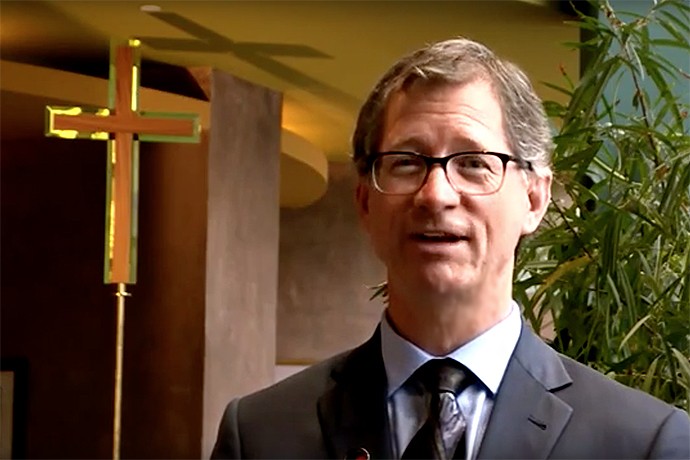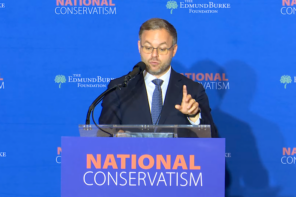If John Dorhauer is successful in implementing his vision as the new General Minister and President of the United Church of Christ he may be a transformational figure—not only in this historic denomination, but in the history of Protestantism itself.
Whatever history may ultimately record, there is no question that Dorhauer views transformation as necessary to sustain the “missional core” of the Church in our time.

Beyond Resistance: The Institutional Church Meets the Postmodern World
John Dorhauer
Exploration Press
(July, 2015)
Dorhauer has been active in social justice concerns throughout his career, most recently focusing on immigration, private prisons, the environment, and marriage equality. Dorhauer earned a Master of Divinity degree from Eden Theological Seminary and a Doctor of Ministry from United Theological Seminary.
He will now lead one of the most iconic Christian churches in American history. One widely perceived as having fallen on hard times.
The UCC is the direct institutional descendent of the Pilgrims who came to the New World on the Mayflower, and was the church of the influential 18th century preacher, Jonathan Edwards. The UCC’s photogenic white churches still populate the village greens of New England. It also prides itself as a “church of firsts,” They were among the first Americans to oppose slavery. By 1785 the church had ordained the first African-American protestant minister; in 1853 ordained the first woman as clergy since New Testament times; and in 1972 ordained the first openly gay person.
So it was no surprise that when marriage equality overcame the last legal hurdle in Arizona, Dorhauer found himself standing in that tradition with other progressive clergy outside the Maricopa County Courthouse holding a sign stating: “We stand ready to marry you.” He officiated at the first legal same sex wedding in the state.
Yet in recent years, the UCC (along with other churches) has experienced a steep decline in membership—at last count just under a million, or about half of its peak in the 1960s. Reasons for the decline abound, and Dorhauer discusses three of them in his new book Beyond Resistance: The Institutional Church Meets the Postmodern World—which came out just as his term begins. He sees declining birthrates, the cost of maintaining aging property, and postmodernity as critical factors.
All this figures into what Dorhauer says will be one of the main themes of his presidency: to call the UCC to rethink itself and to consider new ways of “being church.” Postmoderns, he says, are less interested in institutional religion than their predecessors and tend not to be joiners but “samplers.”
“A whole new way of discovering the life of faith is emerging without the permission of or training required by the established church,” he writes in Beyond Resistance. “Those engaged in this faith exploration aren’t asking for permission.”
He doesn’t think what some call “the emergent church” will supplant the established churches so much as that the new will develop alongside the old for a long time. But he does foresee “mergers, partnerships, and downsizing as denominations realize over time that they are attracting fewer and fewer customers to the marketplace they currently occupy.”
Such transformations are not unique to the UCC or to even mainline Protestantism. Dorhauer thinks that most religious institutions are in danger of becoming “irrelevant” in the postmodern era. But some conservative Catholics and evangelicals have a different take. They have argued that mainline Protestant churches are mostly irrelevant already—withering institutions that don’t, for the most part, practice true Christianity. They peel off members and churches wherever possible (a source of mainline decline not usually considered by pundits and pollsters.) But some are becoming more circumspect in light of significant membership losses and institutional belt-tightenings of their own.
Dorhauer takes the losses in stride, even in grief. He sees around him “a mature faith that refuses to see death as the last word,” That’s one reason why even a diminishing UCC will likely continue to powerfully shape American Christianity and culture. That, and the fact that the UCC wields considerable institutional capacity via its 5100 churches, seven denominationally related seminaries, eighteen colleges and two publishing houses. (Another thirty colleges, universities and seminaries have varying degrees of history with the denomination, past and present.)
Dorhauer urges leaders to choose “the collective missional calling of the church” over the “perpetuation” of nonessential functions so as not to “fritter away the resources we are asked to steward at the expense of our mission.”
The other main—and more controversial—theme of his tenure will be to address white privilege. Dorhauer, a middle-aged, straight white man with three children, brings to the job a decade of experience in this area, following his doctoral work on how white privilege poses obstacles to a just church and society.
Nevertheless, some of the 4,000 delegates to the biannual General Synod in Cleveland in June questioned whether the election of “another white male” was consistent with the denomination’s commitment to diversity. But in a dramatic session prior to the vote, Dorhauer was prominently endorsed by two African-American pastors, including The Rev. Traci Blackmon of Florissant, Missouri, one of the leaders of the Black Lives Matter movement. The other, The Rev. Damond Jackson of Tempe, Arizona said, “John Dorhauer is a person of privilege in the world we live in, but he has used his white, heterosexual, male power to lift those who live in the world of no-communication, the world of the unheard.”
“Here I am, a gay, black male, born and raised in the South,” Jackson continued, “and John sought me out. I love him.”
Dorhauer’s election was endorsed by 85% of the delegates.
The UCC’s democratic expression of Christianity is a far cry from more conservative and authoritarian forms of church governance. The General Synod delegates knew Dorhauer well, and his election is an expression of where the church is already going. John Dorhauer has been given as profound a democratic mandate for leadership as exists in public life.
I talked and emailed with Dorhauer as he prepared to assume his new responsibilities—and move his household from Phoenix, Arizona to Cleveland, Ohio where the UCC is headquartered. He says he is going to call the UCC to seek to rigorously adapt to the 21st century by considering new ways of “being church.”
His vision is a bold one, but on the phone he quietly shrugs it off, saying it’s just a continuation of the Congregational tradition of more than 400 years.
________________
Frederick Clarkson: In Beyond Resistance you say that we are living in the dawning of a “postmodern” age of Christianity that may last for 500 years. What kind of church do you see emerging?
Dorhauer: The first thing I want to say about that church is that it is faithful. It is a genuine response to the mission of the church from its beginnings—and that is the proclamation of a gospel that changes lives.
I lead with this because too many in the church as we know it assume that what they see happening is either a distancing from authentic spirituality, a rebellion against it, or an indifference to it. But this has always been the case for people of faith: some remain distant to the teachings and practices of spiritually engaged communities, some rebel, and some are indifferent.
The mistake made by people of faith regarding postmodernity is this: they see both the deconstruction of enlightenment faith and the experimentation with new ways to express faith as commensurate with abandonment, rebellion, and indifference.
It is anything but.
What is emerging is the authentic endeavor of people engaged in spiritual practices and disciplines that they find deeply meaningful. They experience institutional religion as stale, irrelevant, and unable to fulfill their spiritual longings and desires.
It is too early to be able to identify the exact nature of the emergent church. But I think we can say this much:
The emerging church is and will be far less committed to a denominational identity than the institutional church. Practitioners won’t find meaning in declaring loyalty to a denomination. They will not only sample the best practices from a variety of Christian traditions, but their spiritual horizons will invite them into a larger spiritual field. If there is a way to encounter the sacred or the divine, a way to draw closer to nature, a way to engender compassion for humanity, they will give themselves over to it without rejection, judgment, or reservation.
There will be less reliance on or need for religious experts: namely, full-time, seminary-trained, ordained or authorized clergy.
“Membership” as currently defined by (and deemed essential for) the institutional church will have no meaning in a postmodern, emergent world. People will belong in both an organic and fluid way to those groups or cohorts that provide their lives with meaning, that meet their spiritual hungers, that equip them to encounter the sacred, and that engage them in actions that effect change in the world.
People may actively participate in two or three such communities of faith. They may stay with one for a while, only to move easily and seamlessly into another for no other reason that it feels right to them.
They won’t be investing their missional resources of time, talent, and money in building and property, in sanctuaries adorned with stunning Tiffany stained-glass windows and nine-rank pipe organs and mahogany pews. They will meet wherever two or three can gather, and wherever the divine can be encountered they will be open to engaging that space and declaring it sacred.
While much of this will feel awkward, unorthodox, and threatening to the institutional expression of the church it is nonetheless an authentic expression of an evolving faith that, like all its predecessors, was birthed out of a call to do justice, to love kindness, and to walk humbly with the divine—and, like its predecessors, was constantly evolving in order to maintain its relevance in a changing world.
What do you think can be done to address white privilege in the UCC?
The first thing that can be done is to raise awareness of the existence of privilege—something that most of those who are the recipients of it don’t admit. People with privilege perpetuate the mythology that everything they have they have earned and that those who go without basic human necessities should just work harder.
I want to challenge the United Church of Christ to develop a set of curricula for local churches that engage them in a process of awareness. When I taught white privilege at Eden Seminary, I would ask the students every day to come back to the next class with answers to one question: “What did you see?”
We won’t be able to dismantle privilege until we can help those who most benefit from it—namely white, heterosexual males—to see its daily manifestation in their lives.
Therefore, we initially want to engage in a deeper conversation oriented towards this seeing. We will start by developing materials to help largely white UCC churches take notice of their “possessive investment in whiteness.” Among those materials will be what we might call a “white audit” handbook.
By this I simply mean an objective analysis of the ways in which whiteness as a social construct are established as their norm. A white audit might include an examination of, for example:
- How many pictures of God and Jesus portray them as white?
- Of the books in your pastor’s office, how many of the authors are other than white?
- How many vendors that the church uses are companies owned and operated by whites?
- How many sermons were preached in the last year confronting white privilege and/or racial injustice?
Then we have to figure out how we can become a white ally.
Becoming a white ally is about choosing to engage in both the intentional dismantling of white privilege and the active creation of a just redistribution of wealth commensurate with gospel values and consistent with a commitment a vision of racial equality those values call for.
This is the harder challenge. Assuming our efforts engender a broader and deeper recognition of privilege, the simple truth is that as a small denomination we can’t make commitments on behalf of an entire culture so deeply invested in white privilege.
Nonetheless, to quote Billy Joel, “I have been a fool for lesser things.” And there are some tangible things we can do. Such as:
- Intentionally committing to calling black pastors or hiring black employees
- Voting to donate a percentage of a church’s income/offerings to minority communities, as a way of engendering a deeper discussion about reparations,
- When closing a church, voting to gift its remaining assets or property to a minority owned 501(c)3
- Teaching members to confront overt racism when they see it
- Choosing vendors from minority-owned businesses
- Creating scholarships for minority students
Asking the United Church of Christ to engage in this new sacred conversation is a way of being consistent with our core values. It may be difficult and it will likely be met with fierce resistance. But it also has the potential to continue in meaningful ways what our leaders committed to a generation ago during the Civil Rights movement—a world in which all will not only be judged by the content of their character and not the color of their skin, but in which all will receive just compensation for the fruits of their labor.
How do you see the kinds of profound changes going on—from marriage equality to considering buildingless churches led by non-ordained clergy in light of the UCC’s roots in the Congregational Church?
Congregational faith was the byproduct of a movement that swept across the European continent designed to remove the constraints of faith from the clutches of a hierarchy that had attached itself to empire.
Built into the DNA of the congregational way was this impulse to entrust each passing generation with the responsibility to make the faith come alive in their time.
We see this manifest in the words of John Robinson, pastor of that small village church in Scruby, England who said to his members as they boarded the Mayflower: “Remember, there is yet and still more light and truth to break forth from God’s holy word.”
We see it in the words of the 19th century abolitionist poet, James Russell Lowell, who wrote in his landmark poem “The Present Crisis:” “Time makes ancient good uncouth; we must onward still and upwards who would keep abreast of truth.”
And we certainly see that spirit carried through today—for example, when we revitalized ourselves a decade ago in our God is Still Speaking campaign, declaring, among other things, that we ought not “place a period where God has placed a comma.”
We have always asked each generation to reinterpret the practices of the faith in order to prevent either a stale faith that lost its ability to feed a hungry people; and, as important, to mitigate against the tendency to be co-opted by establishment authority as a tool for control.
The question for the church is not if we should create space for these changes, even when they threaten the stability of our institutional investments. The question is instead whether or not those who are creating these new expressions of the faith are doing so out of an authentic and genuine invitation of the same Holy Spirit that has fed the church from its birth.
In Beyond Resistance, you suggest that some churches should stop struggling and to plan to “die with dignity.” You’ve also said that “the best days of the United Church of Christ are ahead of us.” What do the best days look like in a time of managing what you’ve called “diminishment”?
For me, it is important to see the 1957 merger that created the United Church of Christ—not as the establishment of an institutional expression of the church or the creation of a new denominational identity, but as the birth of a movement.
In “The Basis of Union,” our founders wrote the following: “Believing that denominations exist not for themselves but as parts of that Church, within which each denomination is to live and labor and, if need be, die;” and a little later in the same document wrote: “This name expresses a fact: it stands for the accomplished union of two church bodies each of which has arisen from a similar union of two church bodies. It also expresses a hope: that in time soon to come, by further union between this Church and other bodies, there shall arise a more inclusive United Church.”
We don’t know if the United Church of Christ is called to die as an institution; but if it is, it will do so called by the Holy Spirit to create space for what may emerge for the sake of a movement we committed to being wholly a part of. What we do know is that this impulse towards an organic unity, fully reflective of what was intended by Jesus when he prayed “That they may all be one,” is something that we are still very committed to.
This movement towards unity, towards an embrace of that which is different as opposed to the maintenance of what has been differentiated, is the pathway to a genuine and authentic expression of faith whose best days are indeed in the future—and to which, by living or dying, we are fully committed.
What do you say to those, like Tony Perkins of the Family Research Council, who question the authenticity of the Christianity of the UCC in light of your views on marriage equality? And what do you say to Perkins’ related idea that religious liberty is really only for those who have religiously orthodox views?
There really isn’t much to say to Tony Perkins. His mind is made up and I’m not going to change it.
What I would say to others is that this phenomenon of casting aspersions on the authenticity of a person’s Christianity because it doesn’t fit into established orthodoxy is nothing new. We read in the early accounts of Scripture that Paul’s teachings about circumcision and the law being a curse angered James and the Jerusalem Council to the point that they denounced him and his teachings. The first Jerusalem Council, recorded in Chapter 11 of the Acts of the Apostles, tells the story of a church divided over how far the limits of established orthodoxy could spread.
New ideas stretch old thinkers to the point of condemnation, excommunication—and sometimes worse. Same as it ever was.
I am a part of a movement within the Christian household that tests limits rather than establishes them—that it angers my sisters and brothers in faith neither surprises nor deters me.
As to the question of religious liberty belonging only to those who hold orthodox views? That statement is so blatantly false that I need make no stronger argument against it that it makes on its own. Religious liberty only for those who believe as we do? There is no liberty intended.
Beyond that, the First Amendment not only provides the free expression of one’s religious calling, it prevents the government from respecting any establishment of religion. That Tony Perkins wants his government to enforce his worldview and enact his orthodoxy is precisely why that First Amendment was written—to preclude our government from the undertaking. They knew that people like Tony Perkins would gain purchase at times in the marketplace of ideas. They needed something of substance written into our Bill of Rights that no majority could undermine or undo.
That Mr. Perkins and others are asking for a theocracy is nothing new—and once again our commitment to religious liberty will withstand his attacks on it.





